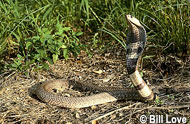Description:
Herpetologists recently have recognized two full species from within the old Naja naja: Naja kaouthia, the monocellate cobra, found from southeastern India to Thailand and Malaysia; and Naja naja proper, the Indian spectacled cobra, found in Sri Lanka, India and Pakistan. These big, quick, dangerously venomous snakes require very large quarters, preferably well-ventilated rooms at least 6 feet on each side. The quarters should be tall enough to stand in during maintenance and not cramped, which will prevent accidents during cleaning and feeding. A lockable hide box or switchbox as commonly used for dangerously venomous snakes is a must. The substrate typically is dirt, but gravel, concrete, carpeting and similar materials are used. Water is provided in a large tub and changed regularly. Keep the temperature between 85 and 95 degrees Fahrenheit during the day, dropping to 80 degrees at night. Heat lamps often are used, as are basking lights. Cobras may be active both day and night. Rodents are the preferred food, and most specimens feed eagerly. Several small to adult rats may be taken each week, as may small rabbits. Feed as much as twice a week during warm weather or if specimens are very active. Reduce feedings during cool weather. Indian cobras grow quickly and can outgrow a large terrarium cage within a year, so consider carefully how you will house adults. These are very dangerous snakes that occasionally cause keeper deaths.
Habitat:
Indian cobras are found in many habitats but generally prefer open forest edges, fields, and the areas around villages, often with water in the vicinity. They are found anywhere their prey, rats, are abundant.
Range:
Found in many closely related forms from Pakistan over India and Sri Lanka into western Southeast Asia, south to Malaysia.
Scientific Name: Naja naja
Species Group: venomous
Family: Elapidae
Size: 4 to 7 feet, sometimes significantly longer
Level: advanced
Weight:
Dangerous: No


